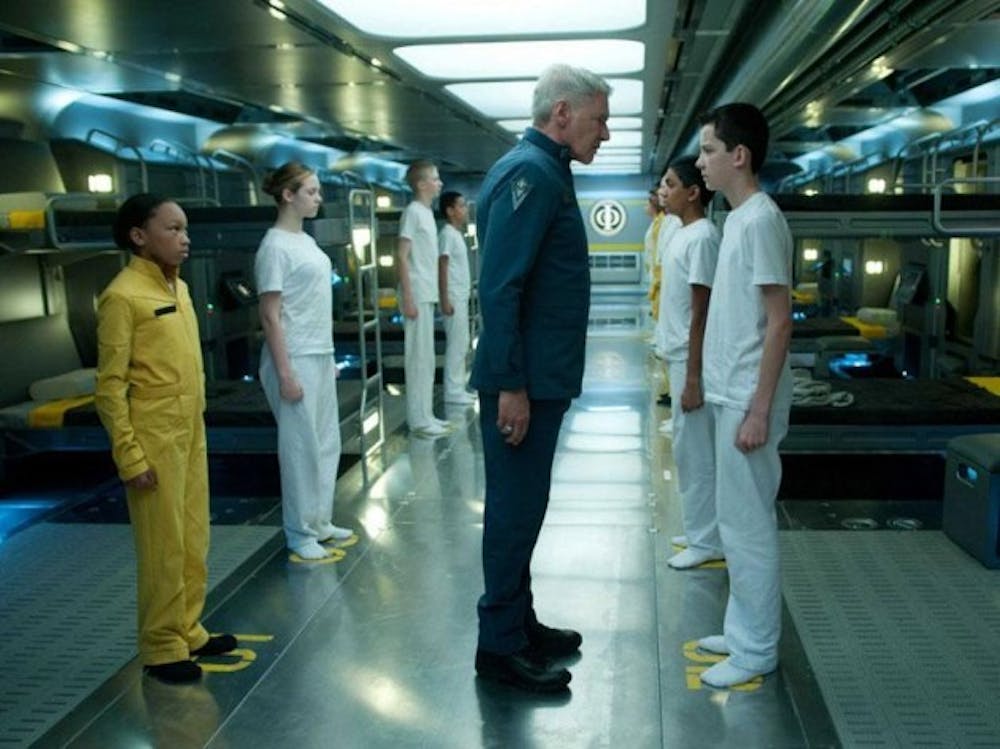Film: Ender's Game
Released:Nov. 1
Studio: Digital Domain and OddLot Entertainment
Grade: B-
The film opens to a visceral, sprawling aerial battle between fighter pilots and the swarming drones of the invading Formics - a warmongering insectoid alien race. The camera pans through the scene and settles in the cockpit of Mazer Rackham (Ben Kingsley, Walking with the Enemy).
The soon-to-be infamous war hero looks over his shoulder, as his wingman's plane bursts into flames in a hail of orange electricity, before flying through the clouds to dodge enemy fire. As his plane is hit, Mazer soars upward, plunging his plane into one of the many large alien carrier vessels above, ending the battle and saving humanity from certain annihilation.
Fast forward 50 years and humanity still hasn't recovered from the devastating assault by Formics. Colonel Graff (Harrison Ford, Paranoia) is looking for a new Mazer Rackham to save humankind from the alien's imminent return.
He finds 12-year-old Ender Wiggin (Asa Butterfield, Hugo) whose unrivaled brilliantly strategic mind gets him sent to Battle School, where the world's best young minds are trained in the arts of war. The hope is they will become the next great commander and end the war against the Formics once and for all.
Directed by Gavin Hood (X-Men Origins: Wolverine), Ender's Game is based on Orson Scott Cards' critically acclaimed novel with the same name. Since its release in 1985, the book has been revered as one of the greatest science fictions stories of all time. And from the film, it's easy to see why.
The movie might not be as grim, as harsh or have many of the book's quintessential scenes or subplots, but it is just as thought provoking as the novels.
"When the war is over, we can have the luxury of debating the morality of what we do," Graff said to Major Anderson (Viola Davis, The Disappearance of Eleanor Rigby) - who's in charge of the Battle School cadet's physiological well-being.
Between the gruff Colonel Graff, Ender and Major Anderson, the film raises a lot of questions about whether the ends justify the means, what humanity will do in order to survive and if winning a war is as important as how the war is won.
These questions culminate in a conclusion that is at once exacting and devastating, but also underwhelming due to the film's pacing. It grants redemption too easily.
Ender's Game proves that cramming 350 pages worth of plot into 114 minutes worth of film is no small feat. From the sluggish start to the abrupt conclusion, pacing is one of Ender's Game's biggest problems.
Even after cutting out many of the book's subplots and crucial scenes, the film still struggles to immerse the audience in Ender's brilliant mind, the world around him, or even the jaw-dropping action scenes toward the end of the movie.
The majority of the film is spent showing Ender's transformation from a damaged youth to an empathetic leader, constantly showing his progression from one challenging test to the next and how he accomplishes each task in brilliant and unexpected ways. At the same time, the film is always building him up to be the "the one" who will save humanity, resulting in a character whose development and progression feels expected rather than earned.
The film spends too much time building Ender to become the strategic mind that will save humanity; when he has the opportunity to show his heroic talents, it feels rushed.
The action scenes in the movie are done well, from the massive zero-g battle room - where students compete in team-based war games - to the enormous and stunning simulations that Ender and his fellow cadets participate in as they progress to Commander School.
These scenes are the film's best, and they are wrapped up in exquisite production values, stunning special effects and carried to new heights by the outstanding soundtrack. They are also some of the film's few instances in which the viewer isn't being told what's happening, but rather being showed, resulting in some phenomenal action sequences that make the viewer wish they weren't so few and far between.
Butterfield truly embodies Ender, delivering an outstanding performance that brilliantly captures the character's nuance, emotion and commanding presence - keying the audience into the character far beyond what the script allows.
As the gruff and tough Colonel Hyrum Graff, Ford delivers a memorable performance, and it's hard not to appreciate seeing the actor in a sci-fi film again.
Besides Ford and Butterfield, the rest of the film's cast carries their weight within the film, even though their characters are rarely given enough depth or screen time.
As a film, Ender's Game rarely lives up to the massive potential or expectations that fans of the book had hoped it would.
While the movie suffered from pacing problems and not enough run time to truly develop the story, the film is still highly enjoyable as a brilliant science fiction meditation on warfare and morality - providing questions and a conclusion that will stay with audience members long after the final credits roll.
email: arts@ubspectrum.com





